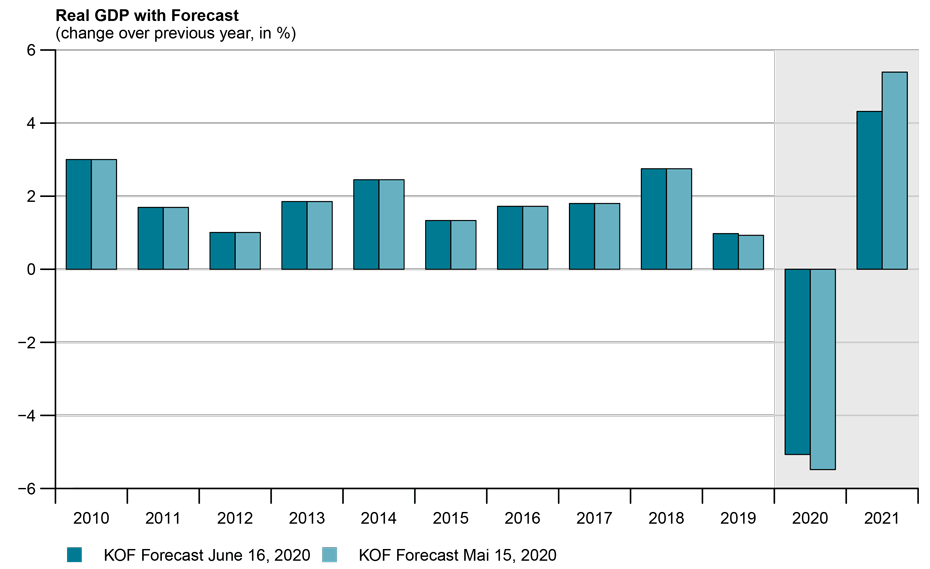Weaker Economic Downturn in Switzerland than in Neighbouring Countries
A special survey shows that a large proportion of Swiss companies are expecting a decline in total sales in 2020 due to the corona crisis. However, the KOF expects the economy in Switzerland to recover more quickly than in neighbouring countries. This year, GDP will fall by 5.1 per cent. The KOF is thus leaving its May forecast for 2020 virtually unchanged.
In May, the KOF supplemented its economic surveys with special questions on the current crisis. More than 3000 companies answered these special questions. 74 per cent of them fear a decline in total turnover in 2020 due to the COVID 19 pandemic. On average, the companies surveyed expect their turnover to fall by around 20 per cent. The other service providers, for example, are expected to see particularly sharp declines.
The economic consequences of the crisis hit 11 per cent of the companies surveyed so hard that they consider their existence to be strongly or very strongly endangered. When asked about restrictions due to the pandemic, 68 per cent of those surveyed cite a decline in demand. 30 per cent report that customers are not allowed or cannot be served/supplied. 28 per cent of companies report that customers are insolvent or postpone payments as a problem. The availability of goods, preliminary products and operating resources is a problem for 22 per cent. Only 11 per cent of the companies surveyed report that they are not affected by the pandemic.
Comparatively rapid recovery expected in Switzerland
However, the economic downturn in Switzerland is likely to be milder than in the surrounding countries. A comparison of the development of gross domestic product (GDP) shows that the recovery in Switzerland is likely to be fairly rapid. The same applies to Germany. In France and particularly Italy, a more severe slump and a slower recovery are expected.
However, Switzerland is rather cautious about the fiscal measures adopted in the context of the crisis compared to most of its neighbouring countries. The Swiss government has so far adopted measures that correspond to a direct fiscal impulse of 3-4 per cent of GDP in 2019. These measures include additional spending on short-time working compensation and unemployment insurance as well as income replacement benefits. In Germany, this direct fiscal impulse amounts to 13-14 per cent of GDP, in Italy only around 1 per cent of GDP in 2019.
The detailed results of the international comparison and the special questions on the Corona crisis can be found in the current KOF Economic Analysis. On the occasion of the publication of the analysis, the KOF has updated its economic forecast. It is currently assuming a decline in GDP growth of 5.1 per cent for 2020 (last forecast: -5.5 per cent). In 2021, growth of 4.3 per cent is then expected again (last forecast: 5.4 per cent). The unemployment rate according to the State Secretariat for Economic Affairs (SECO) will reach 3.6 per cent this year and 5.1 per cent according to the International Labour Organization (ILO). Next year, a rate of 4.6 per cent (SECO) and 6.2 per cent (ILO) is expected.

You can find the full forecast report (in German) Download here (PDF, 1.1 MB).
Contact special survey
KOF Konjunkturforschungsstelle
Leonhardstrasse 21
8092
Zürich
Switzerland
Contact forecast/scenario
Contact international comparison
KOF Konjunkturforschungsstelle
Leonhardstrasse 21
8092
Zürich
Switzerland